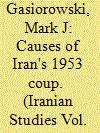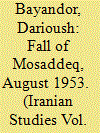| Srl | Item |
| 1 |
ID:
115022


|
|
|
|
|
| Publication |
2012.
|
| Summary/Abstract |
This article presents a detailed criticism of Darioush Bayandor's book Iran and the CIA. Bayandor argues that certain Shi'a clerics, rather than the US Central Intelligence Agency, were the main actors responsible for overthrowing Iranian Prime Minister Mohammad Mosaddeq in August 1953. Bayandor presents no major new evidence to support this claim. He gives too much weight to certain statements, draws unwarranted inferences from others, and discounts or disregards a wealth of evidence that conflicts with his account. He overemphasizes the role of civilian crowds in the overthrow of Mosaddeq and underemphasizes the role of Iranian military units organized by the CIA. And he fails to acknowledge the importance of US and especially British efforts to foment opposition to Mosaddeq before the coup.
|
|
|
|
|
|
|
|
|
|
|
|
|
|
|
|
| 2 |
ID:
115023


|
|
|
|
|
| Publication |
2012.
|
| Summary/Abstract |
Over the decades that followed the overthrow of Mosaddeq in August 1953 a narrative attributing the fall exclusively to foreign conspiracy has taken hold and become institutionalized. In this narrative the internal factors are reduced to the simplest level of abstraction. They do not exist outside foreign conspiracy! This narrative is premised on an Anglo-American coup plot code-named TP-AJAX that was attempted in the late hours of 15 August but failed. The ensuing flight of the Shah generated dynamics which led to the fall of Mosaddeq four days later. The CIA chief operative in Tehran Kermit Roosevelt was quick to take credit claiming that these dynamics were inseminated by his ingenious and spontaneous planning. For abiding internal reasons both the CIA and the MI6 headquarters preferred to claim victory rather than admit failure. Evidence that emerged following the declassification of the State Department papers in 1989 and the leak of a secret CIA internal history in 2000 produced glaring evidence that the fall of Mosaddeq on 19 August 1953 had taken Washington, even its embassy in Tehran, by complete surprise and that post facto claims by Roosevelt were inconsistent both with Washington's explicit policy directives and Roosevelt's own situation reports filed with the CIA Washington during the interval between the two events. Roosevelt later published a phantasmagorical account of the event which, together with reminiscences of a few unnamed former operatives, was given credence by Professor Gasiorowski and associates, who curiously chose to ignore archival evidence.
|
|
|
|
|
|
|
|
|
|
|
|
|
|
|
|
| 3 |
ID:
115024


|
|
|
|
|
| Publication |
2012.
|
| Summary/Abstract |
The overthrow of the government of Mosaddeq has received considerable attention, scholarly and otherwise. The scholarly explanations differ in emphasis, but not in the general contours, particularly regarding the significant role of the Anglo-American secret services. There have also long been attempts to portray the overthrow of Mosaddeq as an isolated event taking place on 19 August 1953 and representing a conflation of royalist and traditionalist sentiments among soldiers and civilians. More recently it has been contended that it was not the Anglo-American secret services but the clerical nexus-prompted by Ayatollah Borujerdi, the highest religious authority in the country-which played the crucial role. This paper argues against reducing the overthrow of Mosaddeq's government to the events of 19 August, and views it as a protracted process. It further argues that assertions regarding the crucial and active role of Borujerdi are, on the basis of available evidence, untenable.
|
|
|
|
|
|
|
|
|
|
|
|
|
|
|
|
| 4 |
ID:
115021


|
|
|